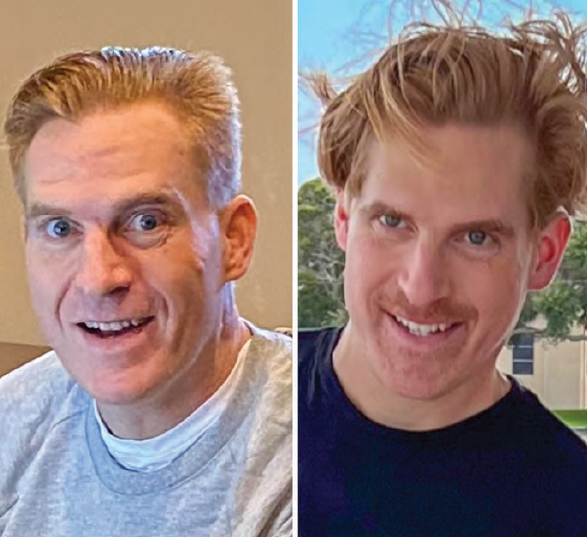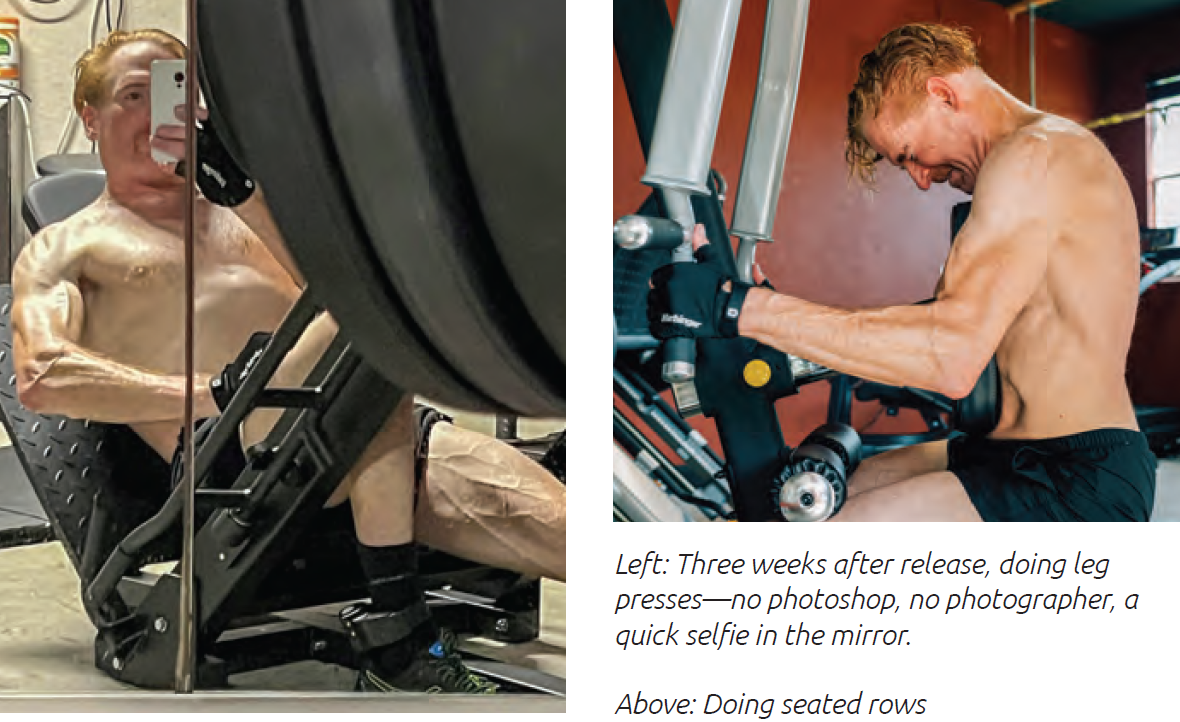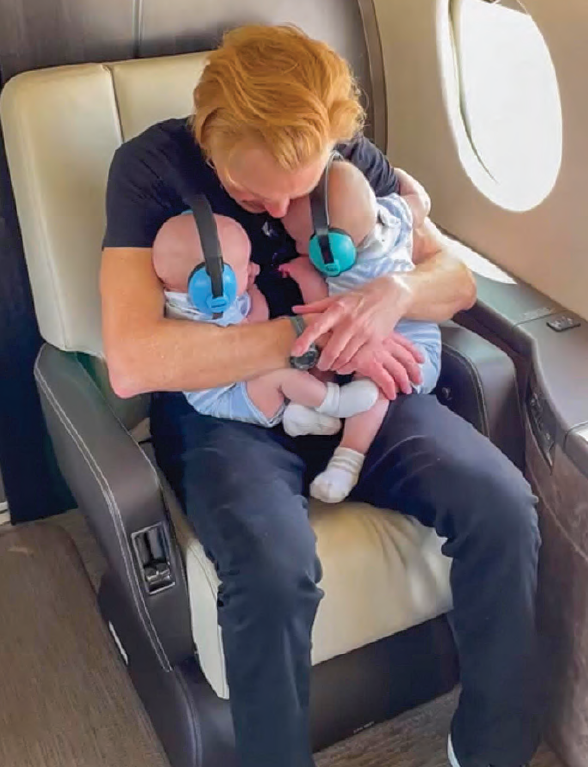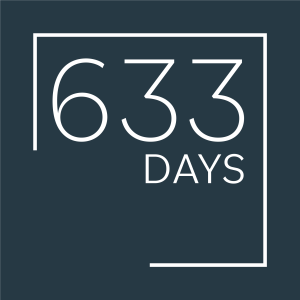PART ONE:
INSIDE
633 Days Inside by Greg Lindberg
PART ONE:
INSIDE
INTRODUCTION
y 633-day stay in a federal prison was the single most positive transformational event of my life. I turned around my health and regained some of my youth through the study of mitochondrial biogenesis. My gray hair literally turned red again, my memory improved, and my body now looks like I’m ten years younger.

The picture on the left in the gray shirt is me the day I checked into prison… the picture on the right in the black shirt is me 12 days after my release from prison. No photoshop.
I also discovered faith through the study of quantum biology. I made life-long friends, and I learned the power of gratitude. I became far more disciplined and focused and got rid of a lot of unproductive habits.
I would not trade my prison experience for anything. Yes, I sorely missed my family and friends. But the experience was a necessary part of my character development and a necessary part of my life plan.
On the day I checked into prison, I released a book, Failing Early & Failing Often: How To Turn Your Adversity Into An Even Greater Advantage. I did not know at the time what advantages prison woul bring—but I had faith that I would find them. By the day I checked out of prison, I had concluded that prison was the SINGLE most advantageous experience of my entire life.
The key to all these advantages is the concept of hormesis.
Biologists use the concept of hormesis to explain how some things that can hurt us in large doses can make us stronger in smaller doses. We know this as “no pain, no gain” or “that which doesn’t kill you makes you stronger.”
According to Aging and Mechanisms of Disease (Mattson 2015) “Hormesis is a characteristic of many biological processes, namely a biphasic or triphasic response to exposure to increasing amounts of a substance or condition. Within the hormetic zone, the biological response to low exposures to toxins and other stressors is generally favorable.”
The single most powerful lesson I learned in prison is the stunning power of hormesis. If you stress your body with fasting, cold temperatures, hard mental exertion, and extraordinary physical exertion—you will see extraordinary improvements in your mind and body driven by mitochondrial biogenesis.
The mitochondria are the powerhouses of every one of your cells. And they multiply and gain mass when they are challenged by hormetic influences such as starvation, freezing, and mental and physical exertion. And the more your mitochondria multiply and gain in size, the better every single one of your bodily functions works.
Prison itself was a hormetic experience. 633 days in prison was in the “hormetic zone” for me where the experience resulted in a biological and mental response that was favorable. If my prison time had been shorter— or a lot longer—this would likely have not been the case.
The lesson here: you must actively seek out painful challenges that make you stronger. Exercise is a well-known example of this. However, the same biological principles that work with exercise are also activated with fasting, hard mental challenges, and exposure to cold. All of these stressors activate mitochondrial biogenesis which can, over time, rejuvenate every one of your cells to a youthful state.

Another powerful lesson I learned in prison is the power of focus. In prison, your email access is severely limited and you don’t have a phone. You are forced to go back to pen and paper, and for me this was revolutionary. I found myself, for the first time, able to THINK and be far more proactive in my thoughts and actions. In the free world, where you are surrounded by constant electronic messages from all your devices, you slowly lose the ability to step back and think strategically.
Any legal system that requires spending a fortune to defend yourself is not a legal system at all—it’s a prosecution system.
Prison also taught me how broken the “justice” system is today in the U.S. I met countless fellow inmates who were in prison simply because they could not afford to fight. They took plea deals because they had no other good options. My own case cost me over $50 million in legal fees. Any legal system that requires spending a fortune to defend yourself is not a legal system at all—it’s a prosecution system. It’s no wonder there is a 97% conviction rate in the U.S. Very few people can afford to stand up to the federal government’s prosecution machine.
I also saw the devastating effects that the over-criminalization of drug use has on African-American and Latino families. Well over half of the inmates at FPC Montgomery were there on some kind of drug charge. Some of the sentences were extraordinarily harsh—25 years for marijuana trafficking—when some states have legalized marijuana. These are good
people whose lives are being thrown away because some people in Congress believe that harsh sentencing somehow can reduce drug use. There has been no evidence that this is the case, yet harsh drug sentences are still being handed down.
If you cannot command yourself to achieve a certain objective, to behave in a certain way, then you will wind up being forced to obey someone else.
In prison, I also learned how commanding and obeying are two sides of the same coin. You cannot be a good commander unless you know how to obey. At FPC Montgomery, there are 1,001 rules and they are changing every day. I enjoyed the challenge of attempting to follow all the rules all the time. If you succeeded in following all these rules, which was no easy feat, the camp treated you well. Most importantly, you must be able to obey yourself. If you cannot command yourself to achieve a certain objective, to behave in a certain way, then you will wind up being forced to obey someone else. Obeying and commanding are the critical building blocks of any achievement in life—and prison reinforced this lesson for me in spades.
I also learned the power of how repeatedly doing the same thing over and over again can lead to mastery. By the end of my 21 months, I was one of the longest serving inmates in the Mobile unit at FPC Montgomery. I cleaned toilets up until the very last day before I was released. I did the same thing every day and had the same routine every week. By the end of my 633 days, prison for me was like clockwork: rise at 5.30am, workout for two hours, clean toilets, check email, take a nap, pick-up my mail, read mail, take a walk, sleep, and repeat. For the last year in prison, I only ate on weekends, which made my weekday routine very simple and uninterrupted.
I enjoyed the ascetism at FPC Montgomery. It was a good place to become singularly focused on my mission in life. I had far too many distractions in my life before I checked into prison. After 633 days of focus, I rebuilt my habits so that these distractions are no longer part of my life.
In prison I spent a lot of time teaching my fellow prisoners about goal setting, stress management, and career planning, and I learned from them in return. The teaching helped me hone the lessons I had learned building and turning around companies. It also brought me joy and inspiration, something I wasn’t sure I would find in prison. I hope the lessons in this book help you find joy, purpose, and success in your own life.
What This Book Is, and What It Is Not
I’ve been battling unfair legal charges for over three years. The charges, the trial and my imprisonment have weighed heavily on my family, friends, and business partners. The biased news coverage has also been tough on them. I intentionally stayed under the radar for the first 30 years of business, hoping to create good while staying quiet. This silence allowed my detractors to define me. I look forward to setting the record straight in a future book when all legal proceedings are well behind me. You can read some of the publicly available documents on my case in the appendix to this book.
The U.S. Court of Appeals for the Fourth Circuit overturned my conviction in June of 2022 ruling that the district court unfairly violated my Fifth and Sixth Amendment rights. I was released from FPC Montgomery on July 15, 2022, after having served 633 days in prison. I missed my father’s funeral and the birth of three of my sons. Those are things I can never get back.
This book will focus not on the things I lost, but on the things I learned. This book is an exploration of the leadership principles that I spoke about in my first book, proved by the crucible of 633 days in prison.

This is me, meeting my sons Max and Thor for the first time. In this picture I am about an hour out of prison. I am still wearing my $14 prison Timex watch. Notice my dark red all natural hair color. They don’t give us hair coloring materials in prison. My head is down because I’m crying tears of joy. I get emotional every time I look at this picture.
I hope always to be a student, seeking self-awareness, but at the same time acknowledging who I am and what I have to offer to the world.
The purpose of this book is to help you turn any adversity, failure, heartbreak, or trauma into an even greater advantage. I have had a few failures and adversities of my own. I’ve been divorced, indicted, convicted, jailed, and have failed at numerous business ventures. I’ve made every mistake there is to make in business at least twice. I had a golf ball sized brain tumor removed, which means I am half-deaf and had to learn to walk again. I’ve lost hundreds of millions of dollars on failed investments.
I am an entrepreneur, a leadership coach, an author, and a father. I have acquired and turned around more than 100 companies, each time fi nding people with the same commitment to hard work, entrepreneurialism, and a roll-up-your-sleeves attitude—and letting them lead.
Despite all the adversity I had faced in my life and career before prison, I had no way of knowing what I would encounter inside. I wrote this book in part to share that story, in hopes that it will help others faced with their own adversities.
I find that the most powerful lesson in navigating failure and adversity comes from Napoleon Hill, who wrote almost 100 years ago that “every adversity, every failure, every heartache carries with it the seed of an equal or greater benefit.”
A warning before we start: This book is not going to give you the answers. Rather, this book will suggest a path that will lead to learning and wisdom through trial, error, and failure. Simply reading this book will not give you this knowledge; you must take the material in this book and turn it into daily action and habits that will ultimately form your character after many years of repetitive effort.
Nothing short of that will last. Nothing short of that will ultimately produce the greater advantage from your adversity.
Adversity will only make you stronger if you put the hard-earned lessons into action every day for the rest of your life. If you fail to put your newfound wisdom to work with new goals and objectives, you have wasted the experience.
Regardless of where you might ultimately find your advantage—in business, your career, art, sports, or your community—don’t expect results quickly. Turning adversity into advantage can take years. But when the advantage does appear—and appear it will if you persist long enough—you will be overwhelmed by its power and wonder where it has been all these years.
The day you stop asking questions, relax and rest on your accomplishments is the day you start dying.
Along the way, you will learn you must always be a student. The day you stop asking questions, relax and rest on your accomplishments is the day you start dying. Relaxations are dangerous in any field, from poetry to plumbing to politics. And remember, I am not the teacher here. I am merely sharing my experiences as a fellow student. Your life experiences will teach you. This book will simply encourage you to have those experiences in the first place.
Don’t be discouraged if your progress is slow in the beginning. Putting the principles from this book to work in your life is not easy. And this book is not meant to be an easy read—easy does not produce strength.
